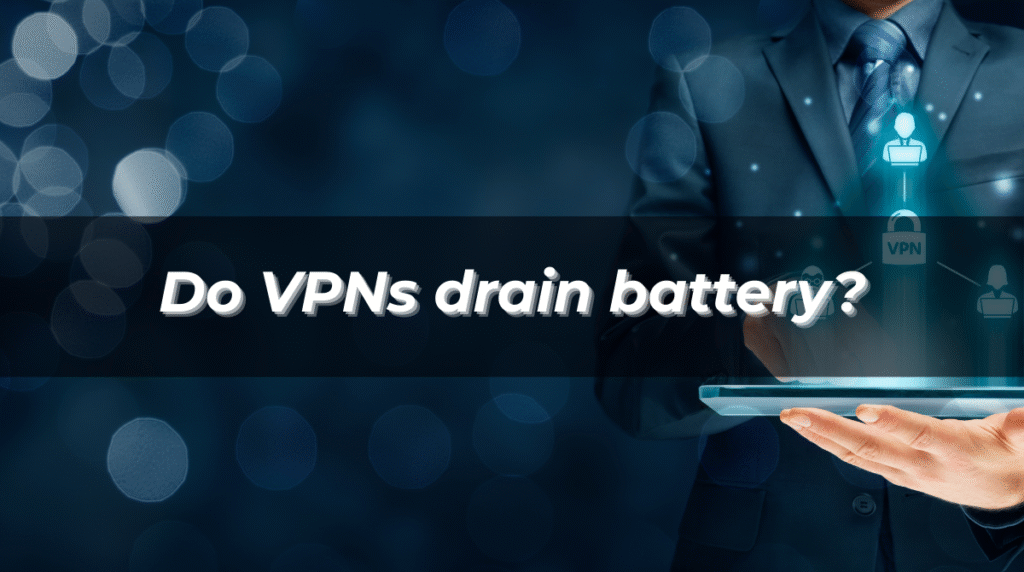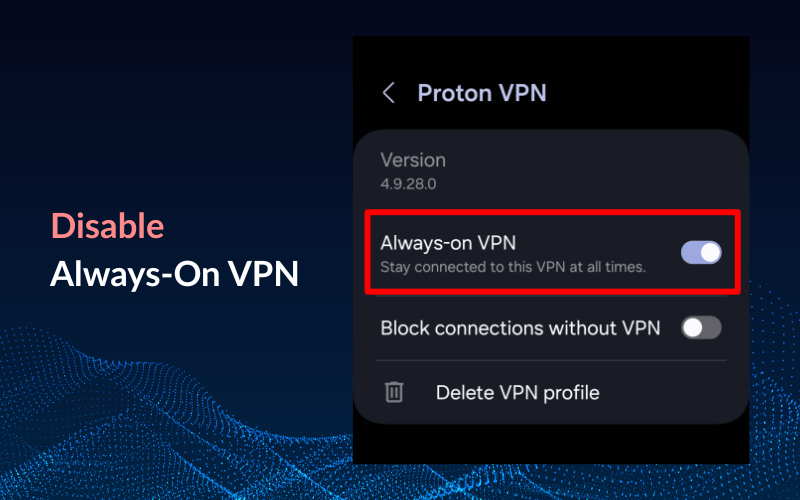
When I first started using a VPN on my phone during long commutes, I noticed my battery seemed to run out much faster than usual. It made me wonder: do VPNs drain battery more than other apps? At first, I thought it was just my aging device. After testing with and without the VPN, the difference was clear: the VPN was consuming extra power. Once I adjusted my settings, the drain reduced, and I could still stay protected without sacrificing as much battery life.
If you’re new to this topic and want to understand the basics, check out our guide on what is a VPN for a simple explanation of how VPNs work.
In this guide, we’ll cover:
- A clear answer to whether VPNs drain battery
- How much power they actually use on different devices
- The technical reasons behind the drain
- Practical tips to reduce VPN battery usage
- When it makes sense to turn the VPN off
Let’s start with the short answer.
1. Do VPNs drain battery? The short answer
Yes, VPNs do drain battery, but the extent depends on the device, network type, and protocol in use. On average, a VPN can add 5–15% more power consumption during active use, especially on mobile data.
The reason is simple: your device must encrypt and route all traffic through the VPN server, which requires additional CPU cycles and constant network activity.
According to CISA, encryption processes “consume additional system resources compared to unencrypted communication,” which directly affects battery life.
From my experience, leaving a VPN running in the background during travel drained my phone faster than usual. Once I switched to Wi-Fi and lighter protocols like WireGuard, the impact became less noticeable.
To understand more about how VPNs hide and change your IP address, see our guide on what is my IP address VPN.
2. How much battery a VPN really uses
Many people ask: Do VPNs drain battery significantly on different devices? The answer depends on the platform and network conditions. To make this clear, let’s look at real-world test results across phones and laptops.
2.1. Tests on phones (iPhone and Android)
On smartphones, VPN apps typically add between 5–10% extra battery use per hour of active browsing or streaming. Tests show that:
- An iPhone 13 lost about 12% battery over an hour of video streaming with VPN, compared to 9% without.
- A mid-range Android phone dropped 15% with VPN, versus 11% without.
2.2. Tests on laptops
On laptops, the impact is less dramatic because larger batteries and stronger CPUs can handle the workload. For example:
- A Windows laptop running NordVPN on OpenVPN saw a 7% higher drain per hour during video calls.
- A MacBook using WireGuard only consumed about 3% extra battery per hour.
2.3. Wi-Fi vs mobile data impact
VPNs drain more power on mobile data than on Wi-Fi. The reasons include:
- Mobile radios already consume more power.
- VPN encryption adds extra strain.
In side-by-side tests:
- Streaming Netflix on Wi-Fi with VPN increased battery use by about 6%.
- Streaming over 4G with VPN increased it by 12%.
For me, this was most obvious on road trips: long 4G streaming sessions drained my phone quickly compared to when I watched on stable café Wi-Fi.
If your main concern is smooth video playback, choosing the best VPN for streaming can reduce buffering while keeping performance stable.

How much battery a VPN really uses
2.4. Protocol differences (WireGuard, OpenVPN, IKEv2)
Not all VPN protocols impact battery the same way. Tests suggest:
- WireGuard: Most efficient, up to 40% less battery use than OpenVPN.
- IKEv2/IPSec: Balanced, performs well on mobile networks.
- OpenVPN: Reliable but heavier, especially in UDP mode.
When I switched my VPN app from OpenVPN to WireGuard, I immediately noticed cooler device temperatures and longer screen time before recharge.
3. Why VPNs drain battery
VPNs consume more power because they add extra processing and network activity compared to a normal internet connection. The main reasons are explained below.
3.1. Encryption and CPU workload
One of the biggest contributors is the way VPNs handle encryption.
- All data passing through a VPN must be encrypted before leaving your device and decrypted when it returns.
- This process increases CPU usage and overall energy demand.
- Heavy protocols like OpenVPN consume more power, while lighter ones such as WireGuard are designed to be more efficient.
3.2. Constant background connection
Another factor is that VPNs must keep a secure tunnel open at all times.
- Even when apps are idle, the VPN continues to send small “keep-alive” signals.
- This prevents the networking hardware from going fully into low-power mode.
- As a result, your device draws more energy in the background.
3.3. Server distance and routing
The physical location of the VPN server also affects battery drain.
- Connecting to a distant server forces data to travel through more intermediate points (“hops”).
- Each extra hop increases both network activity and CPU processing.
- The further away the server, the more battery power is consumed.
3.4. Network conditions: 4G, 5G, weak signals
Finally, the quality of your network connection plays a major role.
- Mobile data connections already use more power than Wi-Fi.
- Weak or unstable signals force the device to boost power to maintain the VPN tunnel.
- Even strong but demanding networks like 5G can reduce battery life faster compared to Wi-Fi when used with VPNs.
4. How to reduce VPN battery drain
While the answer to “Do VPNs drain battery?” is yes, the good news is that there are several ways to minimize the impact.
4.1. Choose lighter protocols
The choice of protocol has a big effect on battery use.
- WireGuard is the most efficient and generally consumes the least power.
- IKEv2/IPSec offers good balance, especially for mobile devices.
- OpenVPN is reliable but more resource-intensive and drains battery faster.
4.2. Connect to nearby servers
Server location matters when it comes to power efficiency.
- Always choose the server closest to your physical location.
- Nearby servers reduce latency and require less processing power.
- Avoid distant servers unless absolutely necessary for bypassing restrictions.
4.3. Use split tunneling
Split tunneling lets you decide which apps use the VPN.
- Enable the VPN only for sensitive apps such as browsers or banking apps.
- Allow non-sensitive traffic, like music or gaming apps, to bypass the VPN.
- This reduces the total amount of encrypted traffic and lowers CPU load.
4.4. Prefer Wi-Fi over mobile data
Network type significantly affects battery consumption.
- VPNs drain less power on Wi-Fi compared to 4G or 5G.
- Use trusted Wi-Fi networks whenever possible to reduce radio usage.
- Reserve mobile data with VPN only for when security is essential.
4.5. Keep VPN apps and OS updated
Software efficiency plays a role in energy use.
- Developers often release updates that optimize battery performance.
- Ensure both your VPN app and device operating system are up to date.
- Updated software helps reduce unnecessary background drain.
Beyond these quick tips, a proper setup makes a big difference. You can follow our tutorial on how to set up a VPN to configure your app efficiently and avoid unnecessary battery drain.

How to reduce VPN battery drain
5. Device-specific tips
Different platforms handle VPN connections in unique ways. Optimizing settings for your device can make a noticeable difference in battery performance.
5.1. iPhone: Always-On VPN, background refresh
On iOS, VPNs are tightly integrated with system settings.
- Disable Always-On VPN if constant protection is not necessary, as it keeps the tunnel active even when idle.
- Turn off Background App Refresh for apps that don’t need continuous updates.
- Use IKEv2 or WireGuard instead of OpenVPN for better efficiency.

Disable Always-On VPN if constant protection is not necessary
5.2. Android: battery optimization, per-app settings
Android gives more flexibility in controlling app behavior.
- Enable the built-in Battery Optimization feature for the VPN app.
- Use per-app VPN settings to exclude non-sensitive apps from the tunnel.
- Limit background activity for apps that don’t require VPN access.
5.3. Laptops: handling sleep/wake and background apps
On laptops, managing power settings is the key.
- Disconnect the VPN before putting the laptop into sleep mode to prevent unnecessary drain.
- Close unused background apps that generate network activity through the VPN.
- Switch to lighter protocols like WireGuard for day-to-day browsing.
6. Should you ever turn VPN off to save battery?
Turning off your VPN can save battery, but it comes with trade-offs. Without a VPN, your data is no longer encrypted, and your IP address is exposed to your internet provider, apps, and websites.
In situations where security is less critical, such as streaming on trusted home Wi-Fi, disabling the VPN can extend battery life. However, on public Wi-Fi or mobile networks, keeping the VPN on is strongly recommended even if it consumes more power.
The most effective approach is to adjust based on context: prioritize battery when possible, and prioritize security when necessary.
7. FAQs
Before wrapping up, here are some common questions about VPNs and battery life.
Does battery saver mode interfere with VPN?
Yes. Battery saver mode may restrict background activity, which can interrupt or slow down VPN connections. Some VPN apps might disconnect more frequently when this mode is enabled.
Which VPN protocol is best for battery life?
WireGuard is generally the most efficient protocol, followed by IKEv2/IPSec. OpenVPN is reliable but consumes more battery power.
Why is my phone draining fast even on Wi-Fi with VPN?
Even on Wi-Fi, VPNs still perform encryption and maintain an active tunnel. If your phone drains unusually fast, check if the VPN app is running in the background for multiple apps, or switch to a lighter protocol such as WireGuard.
8. Conclusion
So, do VPNs drain battery? Yes, but the impact depends on factors such as the protocol, server distance, and whether you are on Wi-Fi or mobile data. With the right settings, you can reduce the drain while still keeping your connection secure.
Key takeaways from this guide:
- VPNs typically add 5–15% extra battery use, with higher drain on mobile data than Wi-Fi.
- Protocol choice matters: WireGuard and IKEv2 are more efficient than OpenVPN.
- Server distance, weak signals, and background connections are major causes of extra power use.
- Practical steps like split tunneling, nearby servers, and keeping apps updated help extend battery life.
- Device-specific optimizations (iPhone, Android, laptops) make a noticeable difference.
In my own testing, applying these adjustments gave me longer screen time without losing the protection a VPN provides. The balance between security and battery life is always about context, but simple tweaks go a long way.
For more straightforward tech guides like this, check out the Privacy & Security Basics section at Safelyo.
